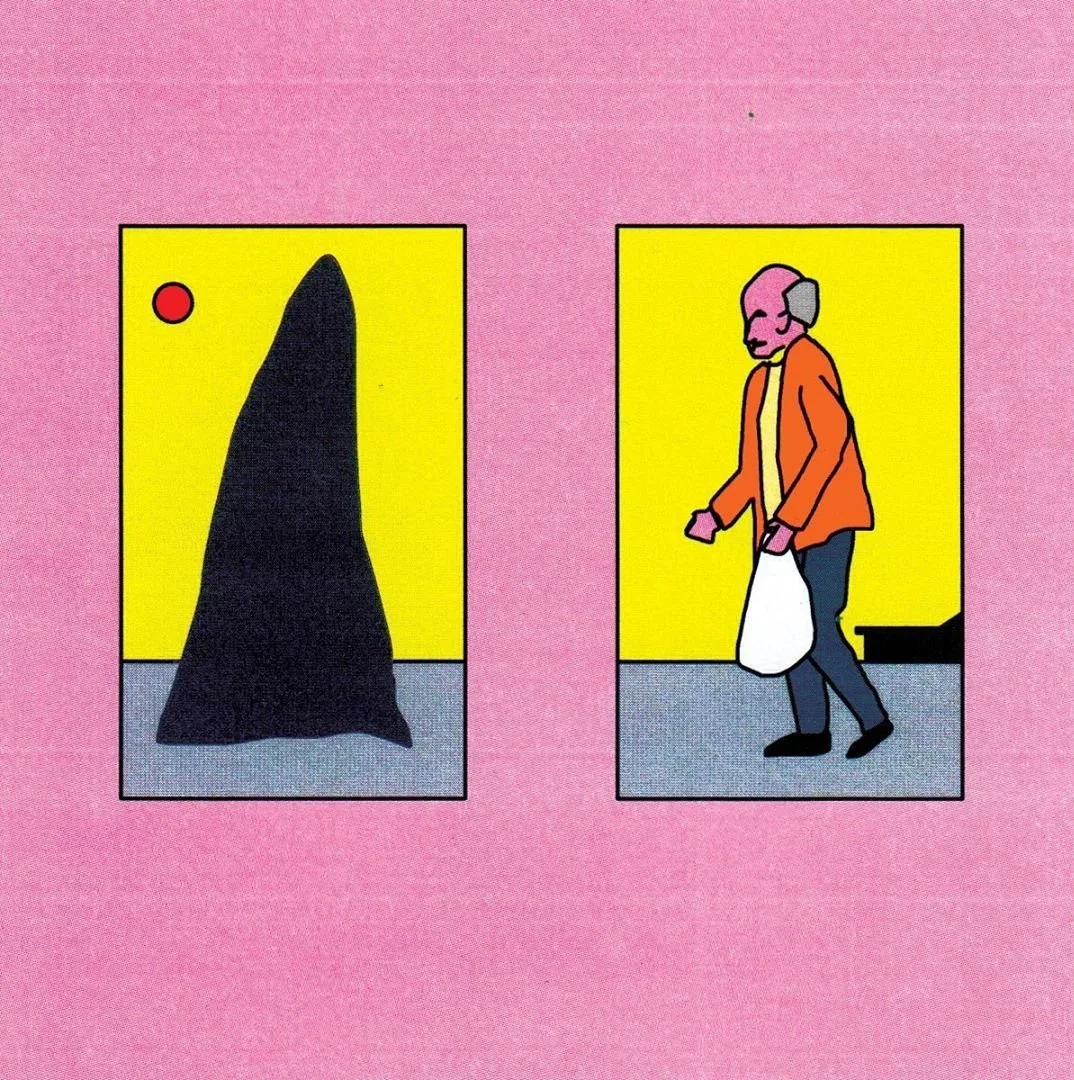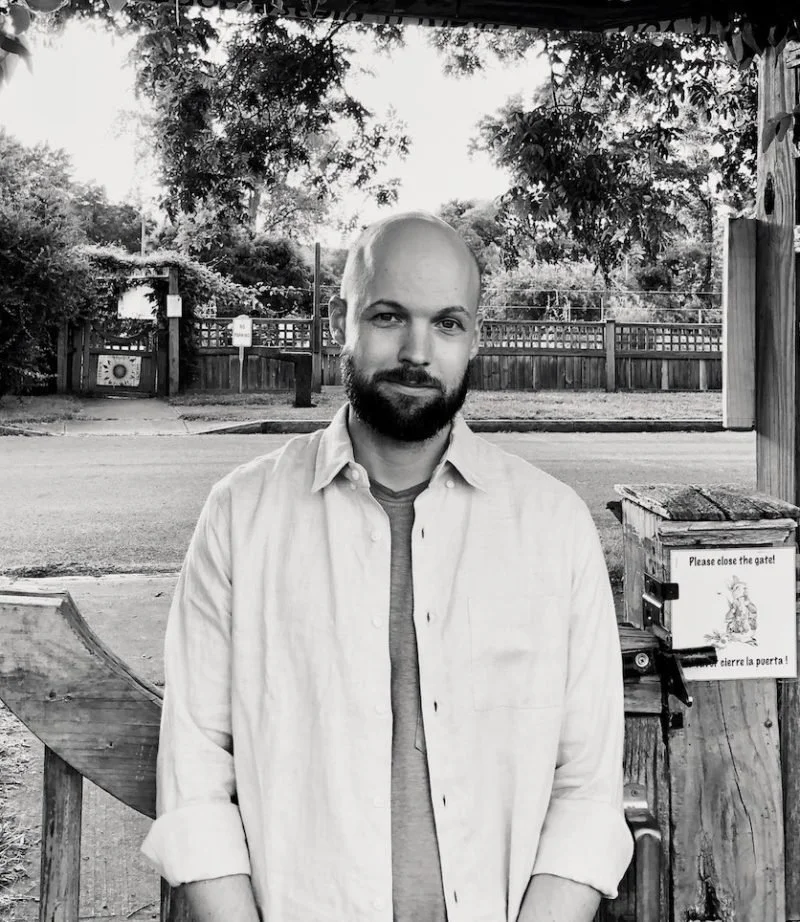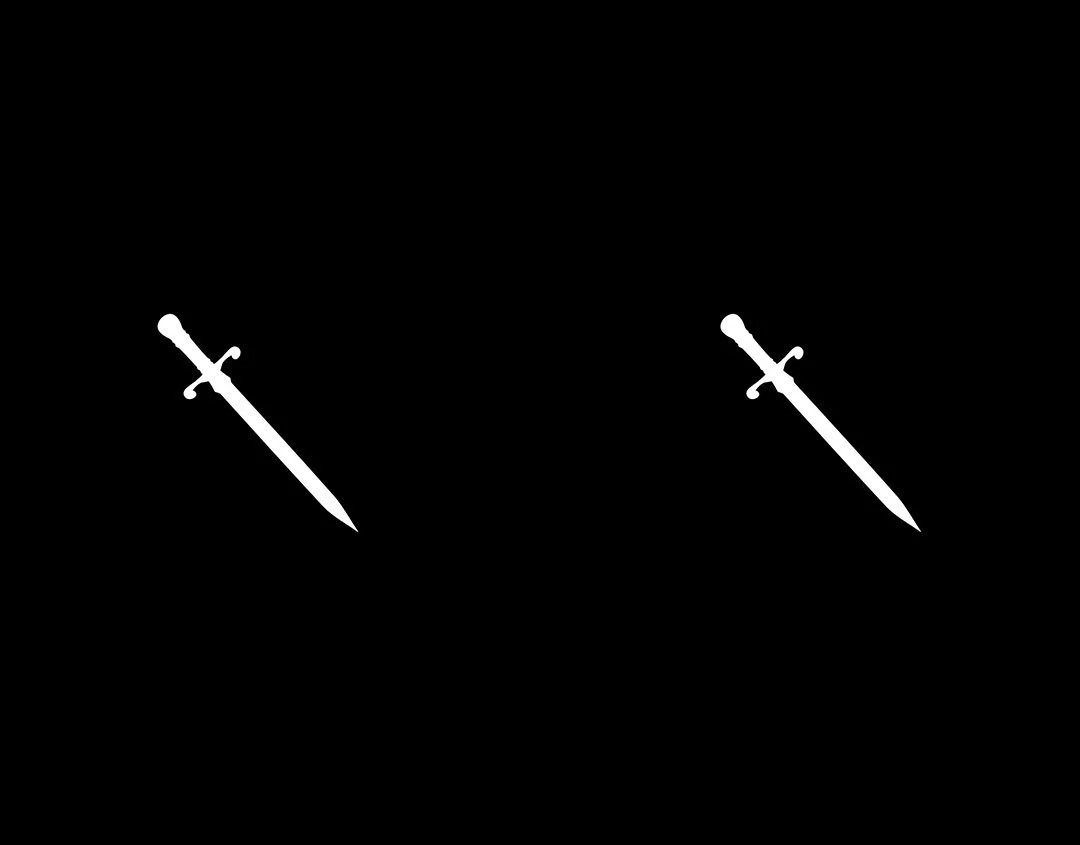In November of last year (God, don’t remind me), I bought two books at the same time through Ghost City Press: Giacomo Pope’s Chainsaw Poems & Other Poems (released in September) and Mike Andrelczyk’s Gateway 2000 & Other Poems (released in November). Once the two books arrived, I slid in their DMs and formed a group chat interview. I read both collections at the same time and talked to them at the same time and now all of it feels like a distant dream. Maybe because I took this long to publish this interview. Sometimes life can be life.
We will get into specifics, but these two artists are both their own sages. Mike Andrelczyk is a poet and painter and clever humorist and haiku guru. He’s released three collections of poetry: the 2018 chapbook The Iguana Green City & Other Poems (also through Ghost City Press), 2019’s Dissolving (a haiku collection through Alien Buddha Press), and the most recent Gateway 2000 & Other Poems. Andrelczyk also paints warm landscapes and interior tranquilities. His art is scattered throughout this interview.
Giacomo Pope has, yes, written and released another book since I started this interview. Sorry! Along with Chainsaw Poems, he also wrote 2019’s 50 Barn Blurbs (in conversation with Zac Smith’s 50 Barn Poems), and 2021’s Two Million Shirts (in collaboration again with Zac Smith). His work is packed with heart and a type of ambient tone I find really calming and solitary. Every page has a pulse. Pope also runs Neutral Spaces (links below) and Screaming Into a Horse’s Mouth (excerpts below) and is probably currently developing a platform to further celebrate poems and words.
I’ve said enough. Here’s the interview.
How old is the oldest poem in your book and which one is the most recently finished / final poem for your book?
Mike: The oldest poem in Gateway 2000 & Other Poems is “Utah.” I wrote that after a road trip from Lancaster, Pennsylvania to Los Angeles. It was originally published on a website called “Zygote in My Coffee” in August of 2009. Most of the poems were written in the past two or three years though and probably like 30 were written in 2020 with the most recent ones being “The Net” and “Hexagons” that I posted on Giacomo’s Neutral Spaces blog in June.
Giacomo: The oldest poem, I think, is “Feelings of Alienation After the New Year”. I wrote it on my phone at about 2am on Jan 1, 2018. I remember sending it out to a bunch of places but never heard back. After the book was published I got a few messages about it, but nothing public. I think there’s something weird and private about the poem. The newest one is “I am Going to be Incredibly Famous” which I wrote for Mike for his Zine “Hey Buddy”. I love that poem because when I read it I think about Mike and how happy I was to write him something.
Mike Andrelczyk via Screaming into a Horse’s Mouth
Where were the poems in your respective collections written? This answer can be as broad as a city/state or as narrow as a desk/couch
Mike: I wrote most of these in our apartment in Strasburg, Pennsylvania. In the bedroom, on the phone, on the couch. Probably some were written at work or on a trip or wherever. Sometimes I think of them as I’m jogging or walking and try to remember them until I get home and then write them in a notebook. I don’t really have a set writing routine though. If I think of something I jot it down somewhere — usually in a notebook or my phone or iPad.
Giacomo: Generally either on my phone when I’m overhearing things (cafes, trains, buses, walking around cities) or in a little notebook in a cafe here in Liverpool. There’s a few exceptions, but first drafts are either done as I hear them, or as small images in a notebook.
A chainsaw walks into a bar. A Gateway computer follows closely behind. Finish the rest.
Mike: The chainsaw says to the computer, “Hey buddy, sit down and have a drink. You look like you’ve had a hard drive.” The computer says “Haha, buddy, you’re a real cut up.”
Giacomo: The chainsaw creaks as the metal cools and contracts from the air rushing from the Gateway 2000. A man walks past and tries to find somewhere to put his USB into the Gateway, but can’t. Feeling like a failure, the man picks up the chainsaw and pulls the starter chain. Outside, he plunges it into the engine of his car and walks home to try and find a more modern computer.
Giacomo, I heard on your episode of the podcast Textual Healing that you often send poems to Mike and Cavin and Zac. I imagine Mike does the same? Were poems from Chainsaw and Gateway passed between you two before going to print? How do you both work in regards to sending drafts?
Giacomo: Yeah, every(??) poem in the book has either been sent as a DM or in an email as a small collection to Zac, Cavin and Mike. Help usually comes at a line-edit level and when it came to making the book I would send a .pdf with all the poems and I would cut/edit poems if any of the three of them felt something could be refined or made better. I have a big problem understanding my own work within context and having three people I respect and trust helped me build confidence in my work.
Mike: I really enjoyed reading Giacomo’s poems as he prepared Chainsaw. He’s a great poet with a real natural poetic sense. He asked me to read them, but he pretty much killed it. We have this group chat that’s mostly just jokes or talking about books or whatever, but we’ll share writing whenever. We all seem to enjoy the same sort of writing. Things with a hint of sadness or humor. Sometimes I post poems in the chat and forget about them and they just disappear and other times I save them —especially if I get a good reaction. For a while I was posting sets of random pictures into the chat and whoever felt like doing it would improvise some piece of writing based on these pictures. “Guided Meditation” came from that exercise and parts of “Glass Waves” came from a poem I posted for the chat called “Cavin is Tripping” or something.
Giacomo: In particular, seeing as Mike is here too, Mike has helped me understand poems in a more formal way. He encouraged me to experiment with line breaks and poetic structure. Sometimes it's Mike, Zac or Cavin's enthusiasm which allowed me to continue some thought process.
Giacomo Pope via Soft Cartel
I love how Giacomo blurbed Gateway and Mike blurbed Chainsaw. Did you both know all along these would be released with the same press around the same time?
Giacomo: I originally subbed to GCP because Mike had a book there. It felt good. I think Mike subbed after I send in Chainsaw, but maybe I’m wrong.
Mike: Yeah, I knew Giac was doing his book with Kevin at Ghost City and was happy to blurb. It’s an honor to blurb the master of the blurb. I liked working with Kevin on The Iguana Green City so I sent him this new one. And it’s even more special to have this book out right after Giac’s book.
Mike, how do you look at this collection next to your previous books? With a chapbook and a collection of haiku in the last couple years, do you consider Gateway your ‘debut’? Do you see these all as separate worlds or one continual breath/body of work?
Mike: These all feel like the same thing. Some of the poems in Gateway 2000 are older than some poems from my chapbook. So it all feels basically the same. The haiku feel a bit different, but I’m always trying to take haiku-like ideas and work them into other poems. I think anyone that writes poetry should experiment with haiku.
Giacomo, since this is your debut collection, do you see yourself continuing in a similar fashion for your next work or moving in a different direction?
Giacomo: I feel generally bad about having made a book. I didn’t like promoting it and I didn’t like my presence online being so weighted towards talking about it. I think it drained the magic about writing for me. I don’t know if I'll ever do something like this again. I think the next project will be more DIY with a limited number of books I send to the people I love. I think this will make me happier.
Outside of poetry, do either of you see yourselves moving into flash fiction or short stories, essays or a novel(la)?
Giacomo: I have an idea for a novel thing I had about 10 years ago back when I would visit Paris and sleep in parks during the day and read cliche literature. I don’t know if I'll do it, but I’ve been tempted to, I think. Who knows. It's probably best if I don’t lol.
Mike: I have all sorts of like fiction or like flash-style writing or half-started novels and I really like doing those. I had a piece of fiction called “Dog Tracing” in X-R-A-Y this past summer and was pretty happy with that. That story is one of a bunch I have about working as a bellman, but I haven’t sent them around. I go through phases with fiction but poetry is always a constant thing for me. It just feels like more fun I think or like more immediate maybe. I have lots of big ideas for writing books and then I just write dumb poems.
Giacomo: Mike’s bellman, I’m a total sucker for his fiction and want a bellman book so badly!
Mike: lol dang. I gotta do it now. Unless I’m in a zone, fiction sometimes feels like work - like making a story move, but poetry just always feels fun to me. I’m probably a lazy bum at heart.
Mike: But also, this might seem like I’m just complimenting Giac because of what he just said, but seriously his story about meeting Zac and helping him move boxes of city water that was on Hobart is perfect. It’s really brilliant. One of those things you read and you kinda get jealous that you didn’t write it.
Mike Andrelczyk via Hobart
What books / albums / movies have been keeping you company?
Giacomo: At the beginning of lockdown, I was reading a lot of Chinese translations by Kenneth Rexroth. I loved Kathryn Scanlan's book, The Dominant Animal, as well as Nicolette Polek's Imaginary Museums. I think what they are writing is what I find most exciting.
Giacomo: More recently, I loved Silence Once Begun, by Jesse Ball and Thanks by Pablo Katchadjian. Both of these books were recommended to me by Sebastian Castillo. Sebastian is also a talented writer and has a new book called Not I, which is a good and fun experimental piece of writing.
Giacomo: Molly Brodak's book, The Cipher, has been read a lot. In the same package, I also got A Lesser Love by E.J Koh, which was a beautiful surprise. I've re-read Siken a bunch to celebrate his new book coming out, and I've recently finished Rachel Cusk's Outline trilogy. I see people online say bad things about it, but I don't know why. I really liked it.
Mike: I enjoyed Roberto Bolaño’s 2666 early in the pandemic. It seemed pleasant to disappear into a big book. I was amazed at the scope and that he’d managed to create a world somehow bleaker than this one. I remembered being particularly floored by one really long sentence in the beginning. I had strange unexplainable like telepathic moments with that book. I also spent a lot of time with a book of paintings called We Ate the Acid by Joe Roberts. Current books I’m reading are The Rings of Saturn by W.G. Sebald, The Cry of the Owl by Patricia Highsmith, Peregrine by J.A. Baker, Woods and Clouds Interchangeable by Michael Earl Craig and The Collected Stories of Lydia Davis.
Mike: My wife and I have been watching lots of Studio Ghibli movies lately and they’re so great. And I really love John Lurie’s new show Painting with John on HBO. I like the close-ups of the light green paint bleeding into the paper and his funny stories.
Mike: For music I’ve been listening to Cass McComb’s songs “County Line” and “The Lonely Doll” on repeat, Keith Jarrett’s “The Köln Concert,” Ornette Coleman’s and Pat Metheny’s “Song X,” McCoy Tyner’s “Inner Voices,” Steely Dan’s “Gaucho” and “Aja,” Phish’s “Siket Disc” and watching lots of their old concert videos, lots of Thelonious Monk, Tim Heidecker’s “Fear of Death” album particularly his song “Nothing” and Madlib and MF DOOM (RIP) and People Under the Stairs (RIP Double K).
If you can, describe your workspace. What are some essentials while you create?
Mike: I have a couple notebooks under my bed I write in or I write on my iPad or my phone or my work laptop. I don’t have any special routines really. I just do it when I think of something. Sometimes I really get in the mood to write a lot and other times I just write a couple lines of poetry that don’t add up to much.
Giacomo: I don't really have a particular space to work. I've been doing a lot of maths / research at a desk in my new home, but writing I generally liked to do in cafes or on benches. It's harder to do that at the moment. Recently, I've been writing collaborative docs using Google which is fun. I think it's been a nice way to see writing as something to do with friendship and play.
Giacomo: Constantly have music though. I've been listening to Matthew Halsall a lot, and with that going back into Coltrane. Mike suggests good jazz to me, Mike has good taste. He recommended the Coltrane, Burrell record, I think.
For this ongoing author interview series, I'm asking for everyone to present a writing prompt. It can be as abstract or as concrete as you choose.
Giacomo: Start describing the most mundane part of your day. Every time you feel the eyes of your narrator shift, allow something impossible to happen. Allow yourself to laugh at the absurdity that everything that you write about happens because you let it.
Giacomo: Re: the above, I often think about how when you give someone Sims, they very quickly delete the ladder, drowning their sim. I feel like people forget you can delete the ladder in your own work.
Mike: My writing prompt is to search online for an old painting of a man trying to catch a catfish with a gourd, look at it for a few minutes and then write a haiku. Haiku doesn’t have to be three lines of 5 / 7 / 5 style just a short poem of about 17 syllables where you juxtapose images.
Giacomo Pope via Screaming into a Horse’s Mouth
In closing, do you have any advice for early writers? Or rather, what's something you would have liked to have known when you first started writing?
Giacomo: I don't know if I have enough experience with writing, but as a more generic piece of advice: create your own space to play. If you have something to say, don't wait for someone to tell you it was worth doing. If you're waiting for validation, my gut feeling is no feedback will ever fulfill that feeling.
Giacomo: I love writing because of the friendships I now have with Mike, Zac and Cavin. If you're reading this interview from Twitter, I encourage you to use Twitter to reach out to people you respect and to talk with them. I feel there is a huge potential for positive interactions online and we miss out on this because we're encouraged by Twitter to be aggressive.
Mike: My advice for writers is do it for fun. When the writing feels really fun, the reader will probably have fun reading it. And my other piece of advice is don’t listen to writing advice.
Any final thoughts / words of wisdom / shout-outs?
Mike: My final thought is try to laugh more. If you’re looking for a good snack try a honey mango. Truly top-level fruit. Shout out to my wife Stacey, The Dave Eggers Crew and Kevin at Ghost City Press.
Giacomo: Shout out to Screaming into a Horse’s Mouth, which is the best collection of writing online.








































